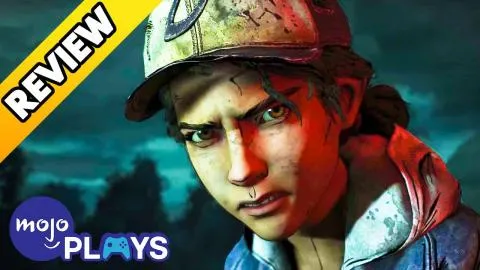Walking Dead: Final Season Episode 4 Review - It Ends Here

Well, here we are again. Another chapter in the saga of “The Walking Dead” draws to a close, another group of developers and artists embarking to parts unknown in pursuit of work. The road to reach the end of “The Final Chapter”, in the narrative and in its creation, has not been without casualties – real human costs. The wider industry will carry on, ever-oblivious to the harm done and those left behind.
It’s hard not to feel introspective about one’s place in the greater machine when faced with a game that is functionally the last will and testimony of a studio, whose staff deserved better than was afforded. Much like any journey with intense peaks and valleys, “The Final Chapter” can never truly be divorced from its wider context and harsher implications... but that doesn’t mean it can’t still be powerful in its own right. Welcome to MojoPlays, and this is our review of “The Walking Dead: The Final Chapter – Episode 4: Take Us Back”.
Amid the carnage wrecked during last episode’s boat detonation, Clementine and her fellow survivors begin the long and harrowing trek back home. Little time passes, however, before the ramifications of actions new and old start catching up to the group, necessitating quick reactions and hard calls. So it is that the episode marches at a determined pace towards its pivotal moment, a choice taken out of the player’s hands in the name of making a decisive statement about character growth.
Any greater specificity here would cut into the effectiveness of going in cold; there’s something special to seeing the mid-episode perspective shift knowing little of how it ultimately plays out. It’s worth noting, for the record, that “Take Us Back” wavers a bit in its first half from some sluggish pacing and ever-so-slightly jarring exposition. In particular, there’s a drawn-out conversation between AJ and Clementine which does support the gravity of later situations but also feels like it could have used some editing to nail a more naturalistic tone.
Where the first half excels is in riding the line between feeding into the audience’s hopes and quietly pushing towards a potentially grim climax. A confrontation atop a bridge swarmed by walkers quickly descends into violent anarchy, the moans of the dead clashing with the cries of the living. It helps reminds us of how improved the game’s engine is from past Telltale endeavours, especially with regards to presenting near-seamless transitions from action beat to action beat.
Then the turning point comes and... well, to say it’s a gut-punch would be to downplay exactly how hard it hit our reviewer, Kurt. Truly, “Take Us Back” comes into its own after the jump, making use of a rather clever interface and perspective shift to keep tensions high. Yet in the end it’s all about closure, finding some semblance of peace and stability in a world so deprived of both. The swell of a familiar and poignant track, the sight of people continuing to work and live – that last stretch is just pure artistry at its finest. And that’s without getting into the lovely tribute to Telltale folks, nor that final heartrending shot.
So much of the episode works in part to solid grasp of visual storytelling fundamentals, like the placement of characters in a scene or the willingness to let silence fall in a conversation. The Telltale Tool engine had flaws, no question, but here it’s been shaped into a resource and a narrative platform worth remembering. Lighting is especially pertinent this time around, what with the number of scenes set in low light or darkness, and it consistently aids in reinforcing powerful moods appropriate to the situation.
Among the solid performances here, the standout is unexpectedly Taylor Parks as AJ. Not to say AJ as a character has been lacking (far from it), but in this last outing Parks really sells AJ as a child torn between extremes and hanging on the verge of embracing more violent tendencies. The rest of the cast continues to ground the narrative with a mix of warm interactions and just enough adolescent snark to keep things from approaching the overly saccharine. That said, the tone overall is decidedly more on the optimistic side as the episode closes out, something the assembled performers help convey quite well.
Seeing “The Walking Dead” through to its end, warts and all, brings with it a kind of melancholy not wholly coherent without further unpacking. Knowing how hard it must have been at every step, recognizing the abuses and the neglect and the mismanagement behind the curtain – even aside from the episode’s own emotional weight, it’s a hell of a thing to cope with. And yet it’s important to recognize the simple truth that people make games, that people pour their hearts and their lives into these works with the intent of creating something truly remarkable.
“The Walking Dead: The Final Season” is remarkable. It is a reminder of that which drives the core of this franchise: humanity’s struggle to not only survive, not only thrive, but to be better in the face of total devastation. It’s a triumph in the face of adversity, it’s a bittersweet farewell to characters and places to which we’d grown attached. Thank you, Telltale, for everything.
